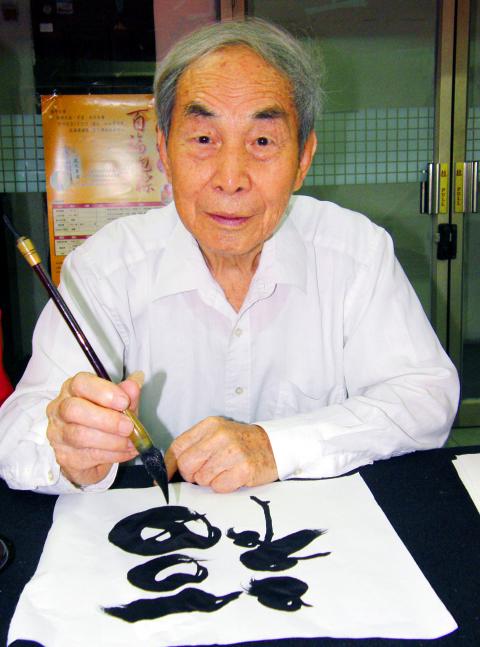“Opening eyes greet the morning and another day of work” — this is the motto which 100-year-old Chao Mu-ho (趙慕鶴) adheres to every day.
However, it is more than a motto that has earned Chao the respect of younger Taiwanese, it is his spirit of living and desire to learn every day.
Born in China, Chao graduated from Shandong Normal University and was forced to move around to avoid the many wars raging throughout China at the time. He made his way to Taiwan at the age of 40 and taught until he retired at 65.

Photo: CNA
Now retired for 35 years, Chao never stopped learning, spending his days reading, writing calligraphy, learning to use a computer, learning English and going to shows.
One of Chao’s most stunning feats was taking the bus everyday from Greater Kaohsiung to -Chiayi’s Nanhua University to earn a master’s degree at the age of 98. For two years, Chao never missed a class despite his lengthy commute, displaying his great determination.
“What the young can do, I can do too,” Chao said, adding that he wanted to set a good example for his classmates.
Chao’s vitality backs his words. Living alone on the fourth floor of an apartment building, Chao is entirely self-sufficient and though he has become slower at climbing the stairs, he is still able to handle many daily chores, such as tending to his garden.
Chao couldn’t help laughing when speaking about his decision to get a post-graduate degree after retiring, saying it all started when he sat the colleges’ entrance exams with his grandson.
Chao and his grandson both made it into college, with Chao getting into National Open University.
He graduated from college at the age of 91.
His decision to pursue his post-graduate studies echoed his journey to college, as he made a deal with the son of a friend to sit for the entrance examinations, a ploy Chao said was to encourage the young man to focus on his studies.
Even his eventual attainment of the master’s degree did not slow Chao down. Instead, he became a volunteer worker in hopes of contributing to society, as well as planning an exhibition of his famed “bird-worms” style of Chinese calligraphy.
Chao learned the bird-worms style from an old calligrapher during his youth and he is now considered a master of the style, writing words shaped as lively birds and worms with a wave of his brush.
When the Huashan Social Welfare Foundation and the Genesis Social Welfare Foundation raised funds for zongzi (粽子) to give to elders without family, Chao was asked to write the words “Helping elders as an elder,” and contributed further by rewarding people who donated by giving them some of his calligraphy.
“That’s what should be done,” Chao said, adding that he felt that writing for charity events made the calligraphy that much more meaningful to him.
Chao said many younger Taiwanese were curious about his life philosophy and the secrets to his longevity.
In his view, there was nothing special other than to live simply and happily, provided there was also physical and mental activity and stimulation.
TRANSLATED BY JAKE CHUNG, STAFF WRITER

An essay competition jointly organized by a local writing society and a publisher affiliated with the Chinese Communist Party (CCP) might have contravened the Act Governing Relations Between the People of the Taiwan Area and the Mainland Area (臺灣地區與大陸地區人民關係條例), the Mainland Affairs Council (MAC) said on Thursday. “In this case, the partner organization is clearly an agency under the CCP’s Fujian Provincial Committee,” MAC Deputy Minister and spokesperson Liang Wen-chieh (梁文傑) said at a news briefing in Taipei. “It also involves bringing Taiwanese students to China with all-expenses-paid arrangements to attend award ceremonies and camps,” Liang said. Those two “characteristics” are typically sufficient

A magnitude 5.9 earthquake that struck about 33km off the coast of Hualien City was the "main shock" in a series of quakes in the area, with aftershocks expected over the next three days, the Central Weather Administration (CWA) said yesterday. Prior to the magnitude 5.9 quake shaking most of Taiwan at 6:53pm yesterday, six other earthquakes stronger than a magnitude of 4, starting with a magnitude 5.5 quake at 6:09pm, occurred in the area. CWA Seismological Center Director Wu Chien-fu (吳健富) confirmed that the quakes were all part of the same series and that the magnitude 5.5 temblor was

The brilliant blue waters, thick foliage and bucolic atmosphere on this seemingly idyllic archipelago deep in the Pacific Ocean belie the key role it now plays in a titanic geopolitical struggle. Palau is again on the front line as China, and the US and its allies prepare their forces in an intensifying contest for control over the Asia-Pacific region. The democratic nation of just 17,000 people hosts US-controlled airstrips and soon-to-be-completed radar installations that the US military describes as “critical” to monitoring vast swathes of water and airspace. It is also a key piece of the second island chain, a string of

The Central Weather Administration has issued a heat alert for southeastern Taiwan, warning of temperatures as high as 36°C today, while alerting some coastal areas of strong winds later in the day. Kaohsiung’s Neimen District (內門) and Pingtung County’s Neipu Township (內埔) are under an orange heat alert, which warns of temperatures as high as 36°C for three consecutive days, the CWA said, citing southwest winds. The heat would also extend to Tainan’s Nansi (楠西) and Yujing (玉井) districts, as well as Pingtung’s Gaoshu (高樹), Yanpu (鹽埔) and Majia (瑪家) townships, it said, forecasting highs of up to 36°C in those areas